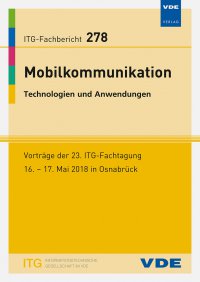Study on Uplink Throughput of Radio Resource Sub-granting and Shortening TTI Schemes for Overlay D2D
Konferenz: Mobilkommunikation – Technologien und Anwendungen - 23. ITG-Fachtagung
16.05.2018 - 17.05.2018 in Osnabrück, Deutschland
Tagungsband: Mobilkommunikation – Technologien und Anwendungen
Seiten: 6Sprache: EnglischTyp: PDF
Persönliche VDE-Mitglieder erhalten auf diesen Artikel 10% Rabatt
Autoren:
Soleymani, Dariush M.; Waswa, Abubaker Matovu; Mitschele-Thiel, Andreas (Integrated Communication Systems Group, Ilmenau University of Technology, Ilmenau, Germany)
Mueckenheim, Jens (Department of Engineering and Natural Sciences, Merseburg University of Applied Sciences, Merseburg, Germany)
Inhalt:
Capacity, reliability and latency act as major requirements of new applications in future cellular networks. Device to device (D2D) communication is seen as a promising solution to achieve these requirements. However, the reliability and latency requirements can be achieved through resource reservation for D2D communication (overlay D2D) at the cost of high resources wastage. This is especially true for applications with small payload and massive number of devices expected for D2D communication. Two schemes have been proposed to minimize the impact on resource wastage while maintaining the required latency: Resource allocation in a finer granularity, i.e. shortening transmission time interval (sTTI) and fast delegation of already allocated, but unused resources, i.e. sub-granting. In this paper, we numerically evaluate the uplink cell throughput for both schemes. The results indicate a better uplink cell throughput for the sub-granting scheme compared to the sTTI schemes, which improves radio resource utilization for the small payload applications.


